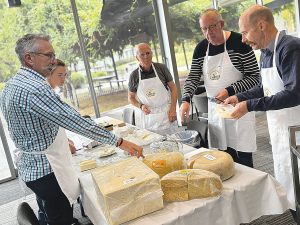Damien O’Connor: NZ united on global trade
When it comes to international trade, politicians from all sides of the aisle are united, says Labour's trade spokesman Damien O'Connor.
 Master Judge Jason Tarrant (left) guiding some of the judges through an evaluation of 253 NZ-made cheeses at Wintec in Hamilton recently.
Master Judge Jason Tarrant (left) guiding some of the judges through an evaluation of 253 NZ-made cheeses at Wintec in Hamilton recently.
Boutique cheesemakers in New Zealand are being forced out of business by several factors, including higher input costs and cheaper imports from the European Union.
And the recent ratification of a free trade deal (FTA) with the European Union by the New Zealand Parliament is expected to allow more cheap EU cheese imports to flood the domestic market.
New Zealand cheesemakers are urging consumers to buy local and help them stay in business.
NZ Specialty Cheese Association chair Simon Lamb told Dairy News that he knows of four cheese companies that have folded in the last 12 months.
Lamb says while there are a myriad of factors affecting the local cheese sector, cheaper imports from the EU is certainly having an effect.
Lamb points out that over the last five years cheese manufacturing in the EU has changed. Whey, a by-product of the manufacturing of cheese is now considered more valuable than cheese. This has led to the manufacture of large quantity of inferior cheese to access whey.
With Covid restrictions over and freight charges stabilising, it appears that more of these cheaper cheeses are finding their way into markets like New Zealand.
Lamb says these cheeses are competing with locally made cheese and creating false expectation from customers.
“For example, for goat milk cheese makers in NZ, just accessing raw milk is costing them $20/ kg. We see these EU cheeses coming in at $30 to $40/kg.
“High input costs like increase in logistics and insurance costs, are pushing margins tighter for smaller operators, who can only increase the price so high before they are forced out of business. And this has started happening.”
He says in the current economic climate supermarkets are also looking closely at their suppliers and small cheesemakers are being priced out. This is also adding pressure on cheesemakers. The association has made submissions to the parliamentary select committee on foreign affairs, defence and trade but isn’t banking on a lot of support from politicians on the EU trade deal.
“We did make our thoughts very clear to the committee, but the bigger picture is that there’s a lot tied to the deal,” says Lamb.
“We will continue to lobby Ministry for Primary Industries and the Government on this issue.”
However, Lamb says for his members the best way to compete with imported cheeses is to keep producing “just as good if not better cheeses”.
“The challenge is to prove to consumers that the brie from France may be cheap, but my brie is much better.”
Last week, the NZSCA awarded 187 medals in the prestigious New Zealand Champions of Cheese Awards.
Master Judge Jason Tarrant guided thirty judges through an evaluation of 253 NZ-made cheeses. Tarrant said the intense judgement affirmed the exceptional quality of locally made cheese.
Lamb says while the number of entrants was nearly the same as previous years, the quality of cheeses entered this year was better than previous years. He says NZ cheeses have also done well on the international stage in the past few years.
“As a small cheesemaking group, NZ is punching well above its weight globally,” he says.
“If we don’t protect our cheesemakers, then we will lose them.”
The Mountain Warrior Shane Cameron is coming back to his roots as key note speaker at the East Coast Farming Expo Property Brokers Evening Muster in February.
OPINION: The euphoria over the Government’s two new bills to replace the broken Resource Management Act is over.
While the recent storms in the upper and eastern part of the North Island have hit a few kiwifruit growers, it is unlikely to have a major impact on the overall industry.
Keratin biomaterials company Keraplast and Wools of New Zealand have signed a new superpremium wool contract which is said to deliver a boost to wool growers.
While things are looking positive for the red meat sector in 2026, volatility in global trade remains a concern, says the Meat Industry Association (MIA).
The quest to find innovative practical, scientific solutions to deal with water-related issues at a catchment level has been the theme of an important conference at Massey University last week.
OPINION: Fonterra may be on the verge of selling its consumer business in New Zealand, but the co-operative is not…
OPINION: What does the birth rate in China have to do with stock trading? Just ask a2 Milk Company.